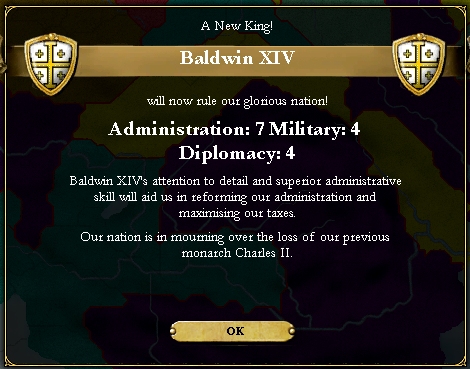Part 20: XX. Baldwin XII, Baldwin XIII, Charles II 1629-1681 A.D.
When King Louis II died in 1632, a few years after his victory against the Byzantines, he left the Kingdom without an adult heir. The Regency Council of the young successor mobilized new armies and moved them to the border with the Timurids, while being careful to leave enough troops on the Byzantine border to prevent another attack.
Some years before, the Scottish Union had joined the Holy Roman Empire, and news came that Queen Mary II of the Scots had become the Holy Roman Empress. Furthermore, the Scots had forced the Irish to cede even more of their New World colonies to them.
In 1637, Baldwin XII became King. Following the advice of his Regents, he launched an attack on Timurids in May.
When your country is ruled by a Regency Council you can't start any wars.

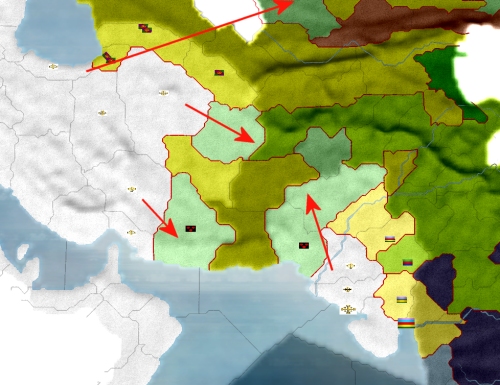
The initial stages of the war went well. The Timurids were still laughably backward in their military technology and the forces of the Kingdom advanced very rapidly. A military access treaty had been signed with the Russian Rum, allowing King Baldwin XII to move his forces across their territory and besiege the Timurid capital of Samarkand. Everything was going swimmingly.
But, two months after the invasion had started, horrible news came.
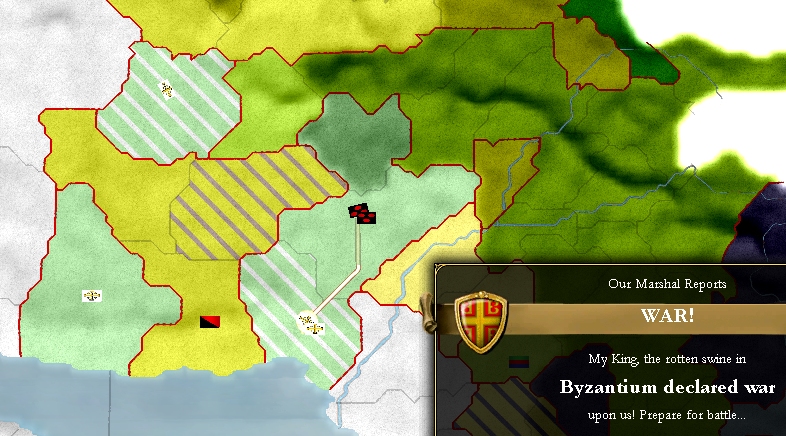
The Byzantines attacked in force, moving against Jerusalem's heavily garrisoned border forts. Worse still, the wily Greeks had signed a military alliance with the Russian Rum, who despite friendly relations, military access treaties, and a royal marriage, joined in on the war against the Kingdom of Jerusalem.
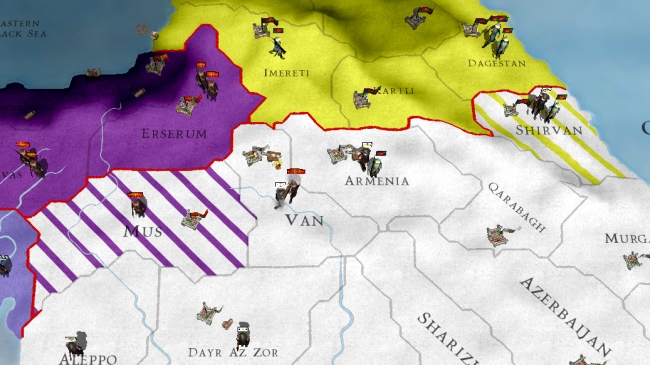
Despite the reinforced border an attack by Rum had been totally unexpected and led to an immediate crisis as Rum's soldiers poured into the Armenia and Persia. Knowing he didn't have the manpower to fight the war to a victory, King Baldwin XII accepted a peace with the Timurid's for two provinces and begged the Rum for peace, sending a large monetary incentive. Fortunately, they accepted.
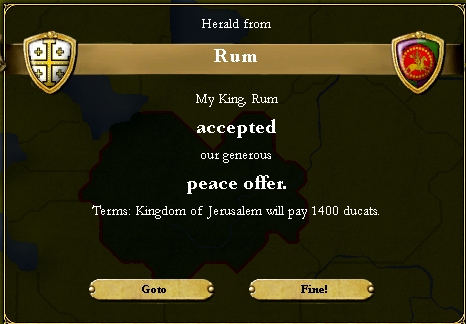
The Byzantines yearned to regain their border provinces and avenge their humiliation, but they bowed to the superior will of the Rum, not wanting to fight alone.
Baldwin XII began to organize new armies and get them near the border. It wasn't likely that the Byzantines would leave them be for long. In the meantime, the Byzantine Emperor took his aggressions out in the north, launching an invasion of the Ukraine with Rum assistance.
The country was quickly partitioned, leaving only a couple provinces free.

The Duke of Flanders, having lost most of his European territories to constant aggression from his neighbors moved the Ducal capital to his Argentine colonies in South Nicholia, declaring himself King of that distant land and invading his Incan neighbors.
Given the change of capital, I decide to give them a tag/flag/name change too.
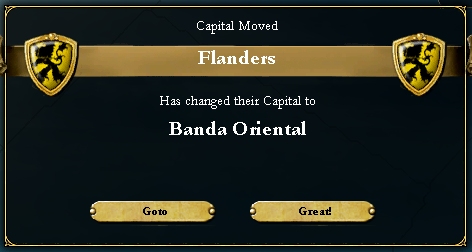

In 1641, young Baldwin XII died of dysentery and another Regency Council took control of the country. Their primary goal was to avert another war with the powerful Orthodox alliance to the north. To that end they sent large amounts of gold northward as bribes. By 1643 relations with both the Byzantines and the Russian Rum were quite friendly. Furthermore, a Royal Marriage was made with the Byzantines and a military access treaty was signed. Hopefully there would be no more serious trouble from Constantinople for a while.
Baldwin XIII took the throne in 1645,with minimal fanfare.

The Russian Rum had continued their push against Delhi, and the Timurid, making it now almost impossible for Jerusalem to connect to India via land. Instead, Baldwin began to plot an invasion of southern India.
But in 1649, despite all the work done to gain their friendship, the Byzantines attacked once again, joined by their allies in Rum.
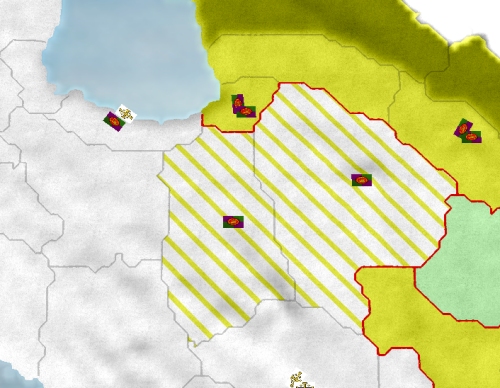
A strong thrust pushed into Persia, but King Baldwin XIII managed to very quickly sign a peace treaty by sending nearly 1200 gold north to Rum. It was beginning to feel like regular tribute and was humiliating to the Kingdom in the extreme. But the simple truth was that Jerusalem simply could not stand against both her northern neighbors at once. The armies of Rum alone were nearly double or triple the number of troops the Kingdom could muster, and Byzantium had at least as many again. They also both had militaries that were more technologically advanced.
Over the next few years, the King worked hard to improve the training of his armies. New methods of military drill were also instituted, hopefully allowing Jerusalem's troops to stay on the field longer against their numerically superior foes.
Another push of the quality slider maxes us out on quality.
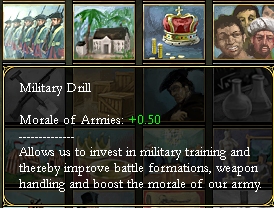
In 1652, Jerusalem invaded the island of Ceylon, off the south-eastern coast of India, as a precursor to an invasion of the subcontinent. The armies of Ceylon were weak and there were no significant fortifications on the island. Within weeks the local lord was begging King Baldwin XIII for peace. The northern half of the island was annexed.
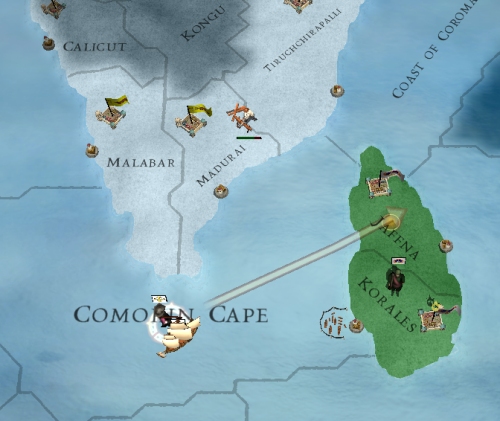
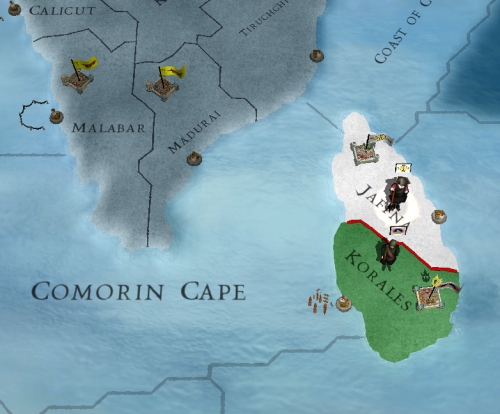
Two years later, in 1654 we develop the technology needed to build Tax Assessors. This is great. Once we build one of these in every province we'll get -0.5% to our inflation every year. That means, with our current inflation around 17% it will take a while to get it back down to zero, but then all our costs will be that much lower and our economy will be much stronger. We start building lots.
Fearing another attack by the Byzantines, King Baldwin XIII had put many extra reinforcements on the Kingdom's northern border. They didn't help.
In the summer of 1654, the Byzantine Emperor and his allies attacked yet again.
The armies of Jerusalem fought bravely, but futilely. The forces of the Russian Rum were numberless. Some rough estimates numbered the invasion at over a third of a million men from Rum alone. For every battle Jerusalem won another wave of fifty thousand Russians would appear.
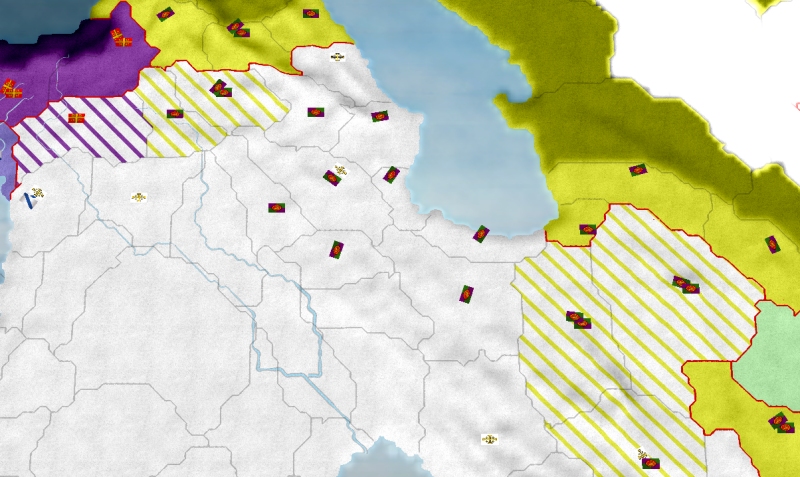
Baldwin XIII dashed from front to front, desperately trying to inspire his troops to victory, but it was becoming rapidly obvious that the longer the war went on the worse the situation would get. Several peace offers from Jerusalem were rejected.
Finally, the King realized that the best thing he could do would be to get rid of the provinces his ancestor had taken from Byzantium. Although he felt like he was betraying the glory of his blood line and the sacrifices of King Louis the Bold, King Baldwin XIII took out a huge loan and sent it north with another peace offer.
This one was accepted.
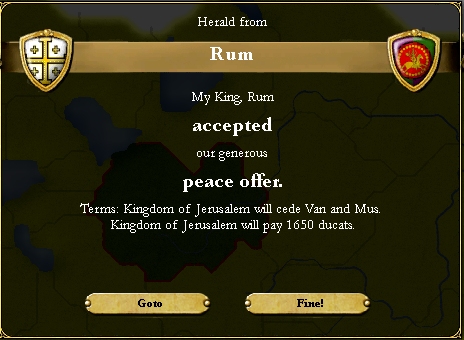
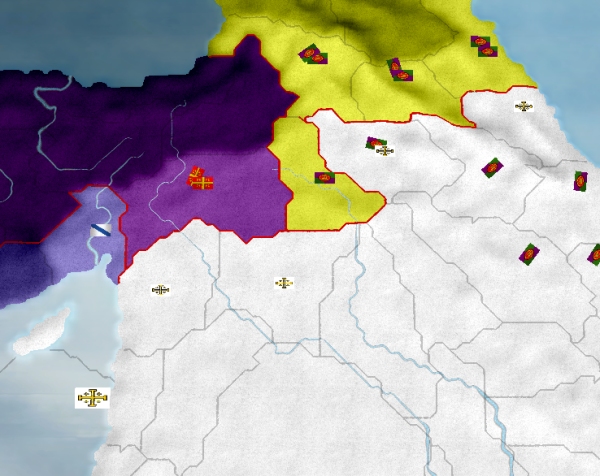
The rich trading center of Van was given to the Russian Rum and Mus was returned to Byzantium. The two provinces were simply not worth an apocalyptic war every decade. Hopefully the Byzantine claim on Van would cause a falling out between Rum and Constantinople, perhaps the alliance would even break down. In any case, without a claim on Jerusalem's territories, especially with a strong border guard, the Byzantines would be far less likely to invade.
A few years later, in 1658, Baldwin XIII finished off annexing the island of Ceylon. At least against the pagans in the east, the armies of the Kingdom were nearly invincible.
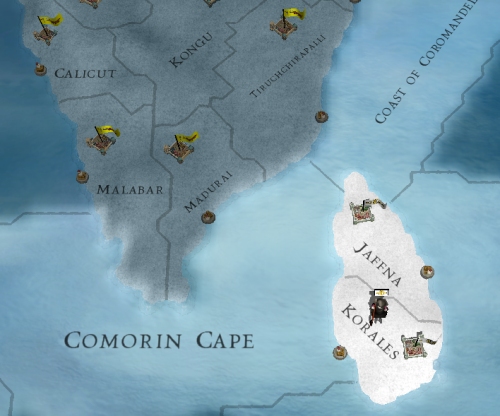
In 1660, King Baldwin XIII died and his son, Charles II took the throne.
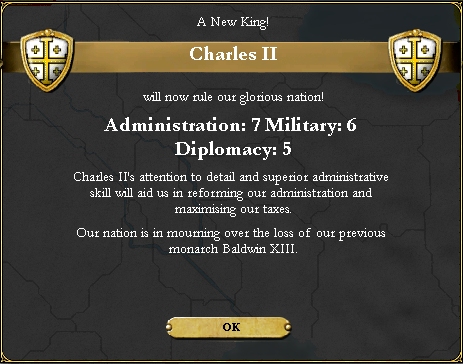
The first news of King Charles II's reign was depressing. The Russian Rum had crushed the Timurids once again and completely blocked off Jerusalem's land access to India. Given the limitless armies of Rum it was not likely that Jerusalem would be able to wrest away an access corridor anytime soon.

In 1665, King Charles finished building Tax Assessors across the Kingdom. Inflation began to drop and Jerusalem's economy began to improve. It improved even more in 1668, when Jerusalem began to adopt the economic philosophies of the Scottish writer Adam Smith, detailed in his book The Wealth of Nations.

In 1669, King Charles eyes turned to the Indian nation of Vijayanagar. The pagan nation ruled much of southern India and was currently involved in drawn out war with Ayutthaya, the masters of southeast Asia.
Deciding to strike while the iron was hot, King Charles II launched an invasion of Vijayanagar that very summer.
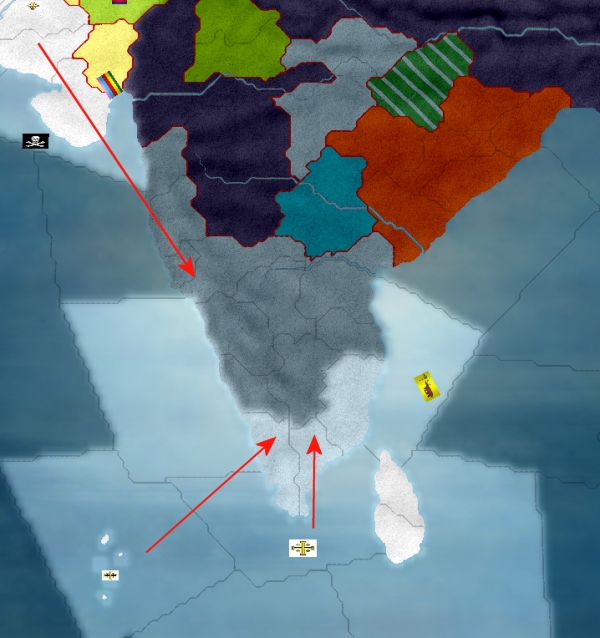
Although the forces of Vijayanagar put up a much fiercer resistance then the armies of Ceylon had done, Jerusalem's armies still advanced steadily. It was a satisfying string of victories after the repeated, humiliating wars with Byzantium and Rum.
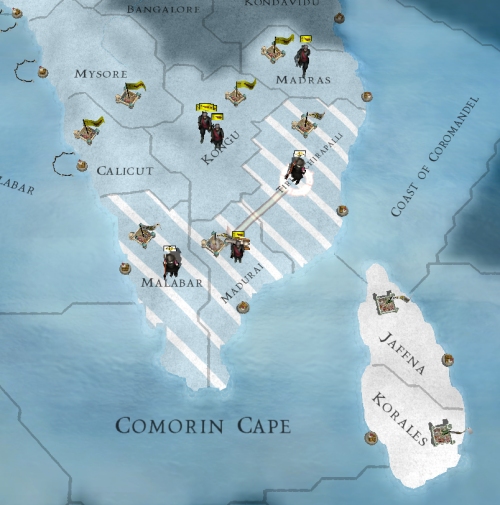
In May of 1672, Vijayanagar ceded the southern tip of the peninsula to Jerusalem. King Charles II was absolutely delighted. During the whole war he had feared another attack from Byzantium, but it had never come. Perhaps, they too, no longer wanted war.
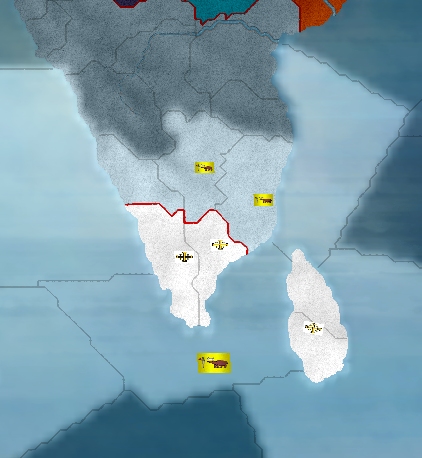
Not everyone was so happy. The colonists in Madagascar, in particular, had begun to resent certain elements of Jerusalem's rule. Blasphemers on the island dared to suggest that mandatory Church attendance wasn't necessary. The local Kingdom garrison quickly taught them respect.

In 1674, the Kingdom of Leon won a great victory against the pagan Aztecs, stripping them of nearly a third of their empire.

Having made peace with Jerusalem, Rum and Byzantium turned their attention towards the richer lands of Europe. Rum forced Venice to cede land in Poland, while Byzantium conquered a broad swath of territories from the Bavarian/Bohemian alliance. King Charles II seethed impotently, fearing how much more powerful his northern neighbors were becoming. Perhaps in the future he could find some way to support their enemies without drawing attention to Jerusalem…
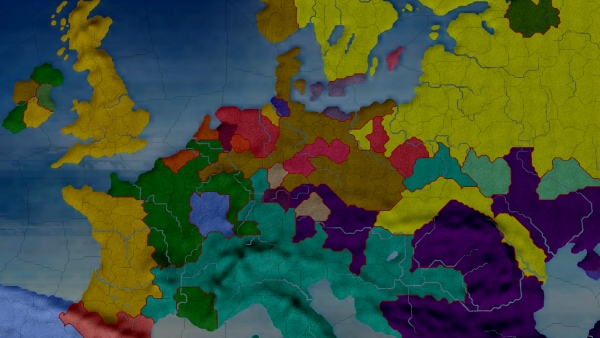
Hoping for another easy victory, King Charles II invaded the African nation of Swahili in the summer of 1678.
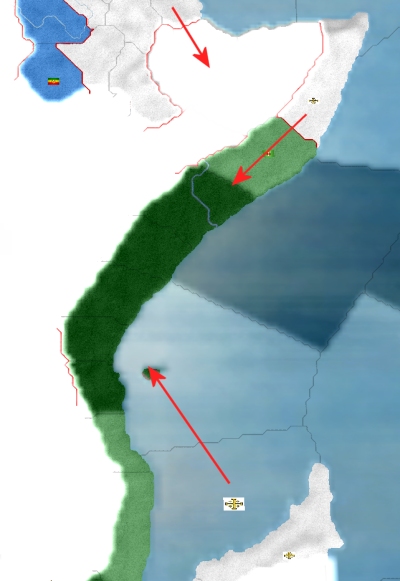
The local tribesmen were no match for the Kingdom's armies, and in 1680 King Charles II signed a peace treaty, granting Jerusalem the island of Zanzibar as well as consolidating the Kingdom's control over the Horn of Africa.
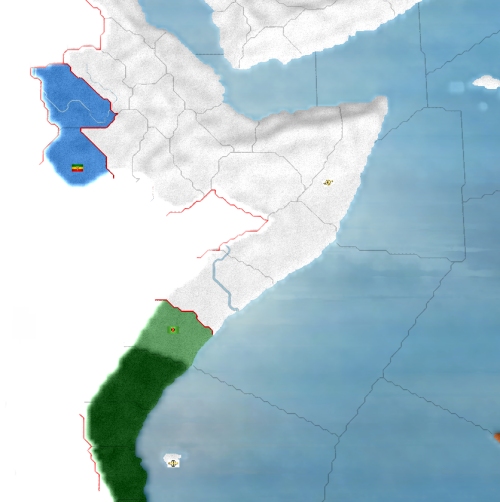
Things were looking up since Charles II had taken the throne. There had been nearly three decades of peace between Jerusalem and Byzantium. The veterans of the brutal wars of the early and mid seventeenth century were old and gray now. The Kingdom's economy was improving and plans were being drawn up to construct a slew of manufactories. Rich lands were being gained in India and Africa.
When he died, in 1681, after twenty years on the throne, King Charles II felt he had done his duty to God and Jerusalem to best of his ability. It was up to his son now, to carry on…
